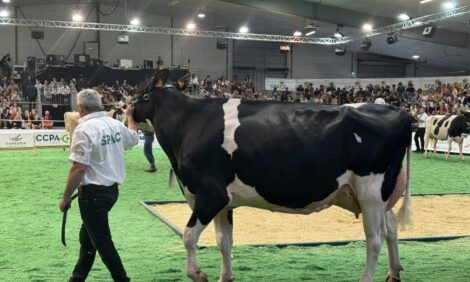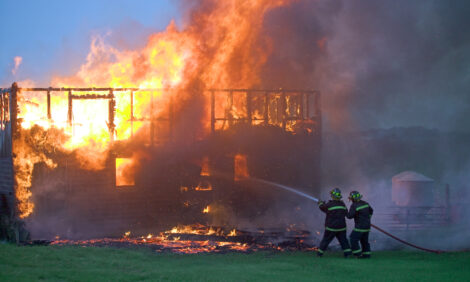



Fly Control Has Positive Impact on Cattle Weight Gain, Stress
US - Don't underestimate the importance of fly control particularly during Summer months. Cattle exposed to flies bunch up to seek protection, and this behaviour can cause an increase in temperature and stress levels, which could lead to weight loss. This behaviour can account for a loss of $800 million annually, suggests Dave Boxler.IANR News interviews Dave Boxler who is an extension educator at the University of Nebraska-Lincoln, in Lincoln County, Canada.
There are three types of flies that cattlemen need to be on the look out for: horn flies, stable flies and face flies.
"I'm anticipating seeing a normal fly population this year," Boxler said.
Horn flies feed off of the blood of cattle and congregate around the horns, necks, and throats of the animals. They feed about 30-35 times a day.
Boxler said that horn flies can cause a loss of $800 million annually.
"It is certainly very important to attempt to control this fly during summer," Boxler said.
Two hundred flies on one animal are enough to see an impact. In one study, calves whose mothers were protected from the horn fly gained an average of 10-20 pounds more than calves whose mothers did not receive pest control, Boxler said.
One way to reduce the impact of horn flies is to buy ear tags filled with an insecticide. These ear tags can cost about $1.50-$2 per tag. There are also other methods of horn fly control such as dust bags, oilers or feed-additives (IGRs).
Stable flies also are blood-feeding flies and feed off of the legs of cattle.
"In a pasture setting, stable flies are most difficult to control," Boxler said.
Cattle affected by stable flies will stomp their legs and bunch in corners of the pasture.
Stable flies have strong impacts on weight gains, Boxler said.
In one study, steers that were protected from stable flies gained on average .44 pounds more per day than steers that didn't receive protection.
Boxler said that the most effective method of controlling stable flies is to spray cattle with an insecticide.
A quart of insecticide can cost around $16-$20. This mixes with water and creates about 25 gallons of spray.
Face flies are another type of fly that bother cattle.
Female face flies feed on secretions from the nose and eyes of cattle, Boxler said.
"It scratches and irritates the eye tissue, which actually sets up the animal for pink eye," Boxler said. "It could cause blindness."
Face flies are a larger concern in areas which receive more than 30 inches of precipitation and have a higher humidity.
"Out in western Nebraska where we have more arid conditions we see the face fly less frequently than in eastern Nebraska where the face fly is an annual problem," Boxler said.
- See more at: http://ianrnews.unl.edu/keeping-flies-cattle-prevents-stress-and-weight-loss#sthash.VBDm656R.dpuf
TheCattleSite News Desk


